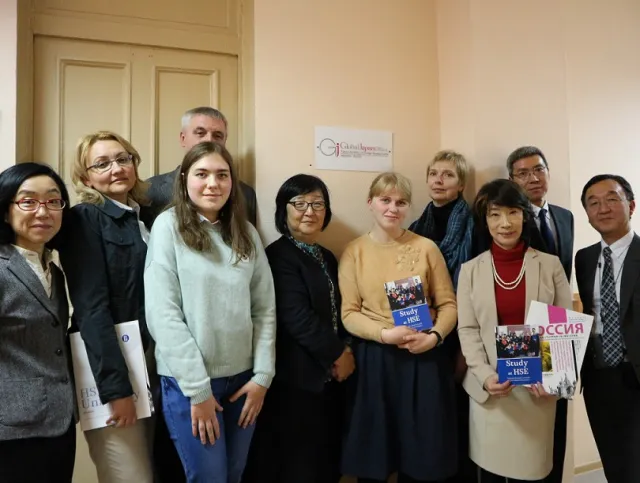2017 Activity Report
March Activity Report
5 March 2018
Global Japan Office Coordinator
Sofiia Pasivkina
On March, 2, School of Asian Studies, HSE hosted a lecture-interview by contemporary Japanese author Kaori Ekuni (江國香織). The meeting was organized by Japan Foundation. During the lecture Atsushi Kiba, an interviewer and Ekuni’s editor, asked many questions about the way of writing, creativity, style and the message that Ekuni states in her stories. Russian readers warmly welcomed the author. In Russia Ekuni is mostly famous through two translations, “Twinkle Twinkle” and “God’s boat”.
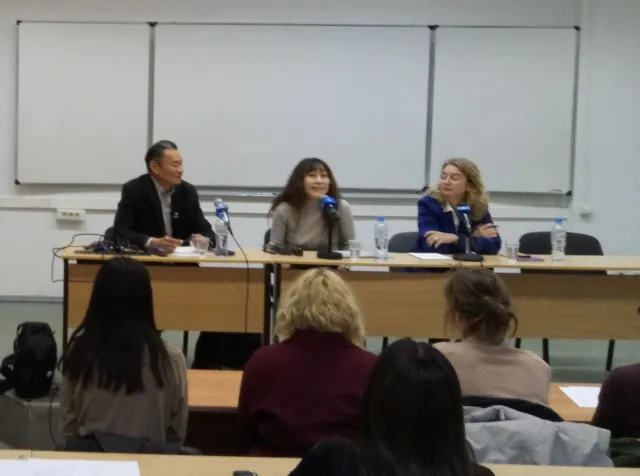
On March, 3, HSE’s Japanese Culture Club organized another interesting event, presenting Japanese culture. This month the members and guests celebrated Hina-matsuri (雛祭り). Once again I received an invitation to participate, as a representative of GJO Moscow. The student from TUFS Mr. Anzai Yoshihide also took part in the meeting.
Some students from the permanent members of the Club began with educational presentation about Hina-matsuri (Momo no Sekku). They also touched upon other children’ festivals of Japan: Children’s Day (Tango no Sekku) and Shichi-Go-San.
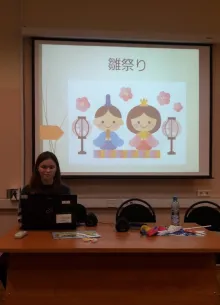
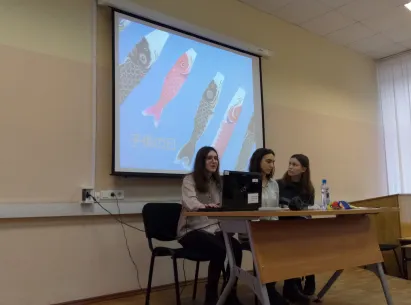
This time the organizers suggested to make origami Hina doll sets (ひな壇, Hina dan).
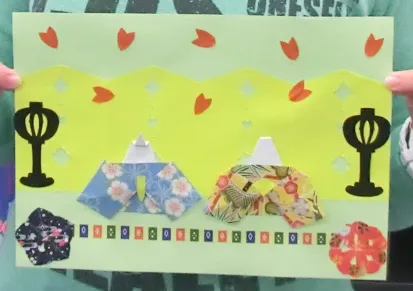
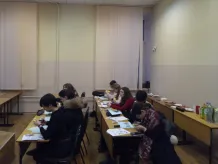
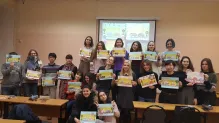
On March, 15, I met TUFS’s postgraduate student Ms. Rina Ajima, who came to Russian State University for the Humanities (RSUH, Moscow). It was her third visit to Moscow as a researcher. The following is our small talk about her studies, experience and Moscow life in Japanese.
***
インタビュー
安島里奈さん
東京外国語大学 博士前期課程 世界言語社会専攻
ショートビジット モスクワ ロシア国立人文大学
1. 「世界言語社会専攻」という教育プログラムは興味深そうですが、具体的に何を研究していますか。
そのプログラムでは様々なテーマが研究できます。カザフスタンのシャーマンや、沖縄の原住民の伝統、言語、ロシアの絵画などのテーマについての研究が行われています。私としては19世紀のロシア文学を分析していて、特に、様々な作品に表れる人魚の表象を研究の中心としています。その人魚はロシア語で、「ルサールカ」と呼ばれています。
2. ロシア語を勉強してもう何年になりますか。
もう五年間です。大学の四年間と大学院の一年間です。
3. 大学に入る時、どうしてロシア語を勉強することにしましたか。
それは面白い話です。最初は、大学にぜんぜん入学したくなかったです。江戸切子や箱根奇木細工といった伝統的な技術を習いたかったです。でも、東京外国語大学のプログラムを紹介するイベントに参加してみました。その時にキリル文字を見て、それがわかるようになりたいと思って、入学しました。それ以来、ロシア語を頑張っています。
4. モスクワははじめてですか。
もう三回目です。その前、寮で生活をしましたが、今回はホームステイになりました。
5. モスクワの生活はどう思いますか。
もう慣れました。最初は大変でしたが、生活するにつれて、慣れてきました。しかし、毎回びっくりさせられることがいくつもあります。たとえば、今回は、突然道で知らない男性に花をもらいました。すぐに、その日は国際女性デーだと思い出しましたが、たいへん驚きました。また、買い物した時、お釣りの代わりにマグネットをもらいました。
6. 日本の生活や伝統的なものの中では、ロシアに何が紹介されたらいいと思いますか。
たいてい、ロシアでの日本のイメージは江戸時代っぽいと思います。たとえば、芸者や武士、浮世絵などがよく知られています。が、様々な伝統工芸品も人気になったらうれしく思います。江戸切子や箱根奇木細工もその中に含まれます。それから、便利なものも紹介されたらいいと思います。百円ショップとか。
7. 今回はモスクワで研究を進めることができましたか。
はい、資料をたくさん集めて、いろいろなことについてご指導や相談をしていただけました。日本に帰って、資料を整理して論文を書く予定です。
***
Interview
Rina Ajima
Tokyo University of Foreign Studies, Master’s Program, Global Studies
Currently on a ‘Short Visit’ exchange at Russian State University for the Humanities
1. The ‘Global Studies’ program seems very interesting but, specifically-speaking, what exactly are you researching?
In this program you can research many topics. Research is being done on many topics such as Kazakh shamanism, traditions of Okinawa’s indigenous people, language, Russian paintings, etc. My research is on 19th century Russian literature, with a particular focus on mermaid symbolism, which appears in many texts. These mermaids are called ‘rusalka’ in Russian.
2. How many years have you studied Russian?
Five years. Four years as an undergraduate, and one year as a master’s student.
3. Why did you decide to study Russian when you entered university?
It’s quite a funny story actually. At first, I really didn’t want to go to university. I wanted to learn a traditional craft such as Edo kiriko (Edo-style glass art) or Hakone yosegizaiku (Hakone-style marquetry). However, I participated in an event that introduced the programs of TUFS. There, I saw Cyrillic letters and thought to myself ‘I want to learn how to read that’, and so I entered the university. Since then I’ve been studying Russian to the best of my abilities.
4. Is this your first time in Moscow?
It’s my third time here. Before, I stayed in a dormitory, but this time I’m staying with a host family.
5. What do you think of the Moscow lifestyle?
I’m used to it. It was hard at first, but I got used to it over time. However, there are a few things that surprise me every time. For example, one day I got given flowers by a strange man in the street. I quickly remembered it was International Women’s Day, but I was still very surprised. Another time, when I was shopping, I got given a magnet instead of change.
6. What aspects of Japanese lifestyle or tradition do you think should be introduced to Russia?
Generally, I think the Russian image of Japan is a bit like the Edo period of Japan. Geisha, samurai, ukiyo-e (woodblock prints), etc. Edo kiriko and Hakone yosegizaiku is included in this. I also think it’d be nice to introduce a few convenient things, like 100 yen shops and such.
7. Did you manage to move forward in your research during your time in Moscow?
Yes, I gathered a lot of data, and received a lot of advice and guidance. I intend to return to Japan, organize my data, and write my thesis.
February Activity Report
5 March 2018
Global Japan Office Coordinator
Sofiia Pasivkina
The beginning of February 2018 was marked by celebrating setsubun. The event was organized by Japanese Culture Club, opened in September, 2017, at the School of Asian Studies (SAS, Faculty of World Economy and International Affairs, HSE). The founders of the Club, Professor Yulia Korovina, Professor Roli Dzhayn and Professor Maria Kireeva, together with their student assistants prepared special program to entertain students and other guests. The special guests, HSE’s Professor Abe Hiroshi and Professor Kurita Satoshi, took parts in different activities. I was also invited to attend this event, as a representative of GJO Moscow.
To make the party more educational, students began with the presentation about the origins and customs of setsubun. They also held a quiz and games with small prizes.
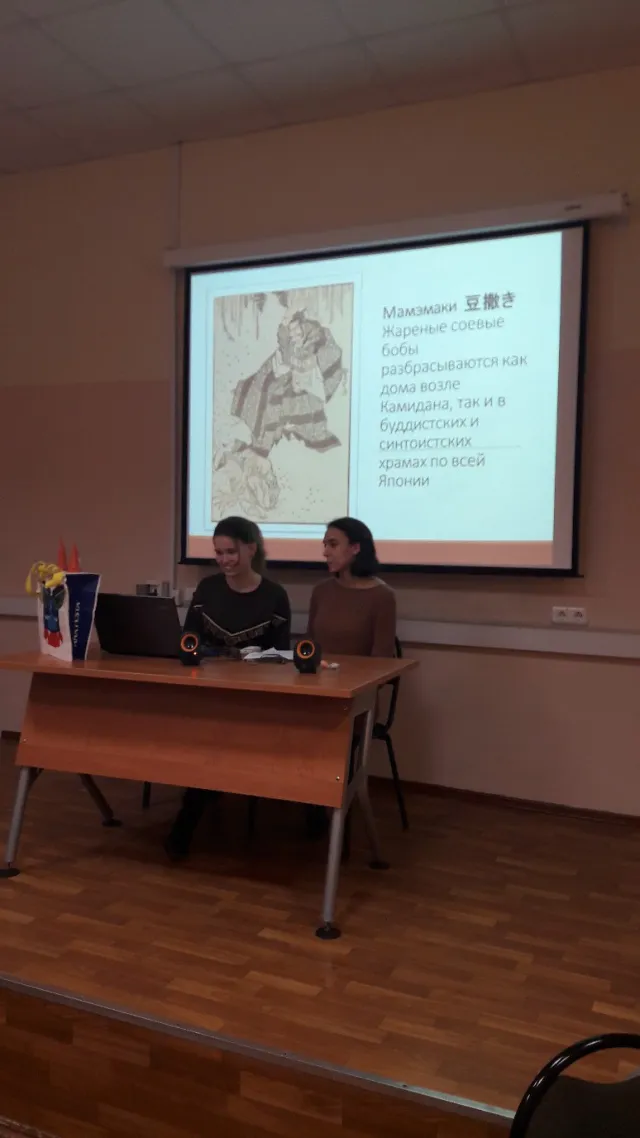
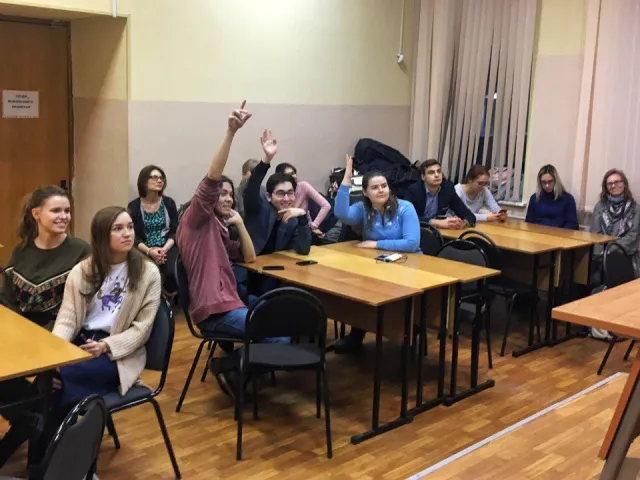
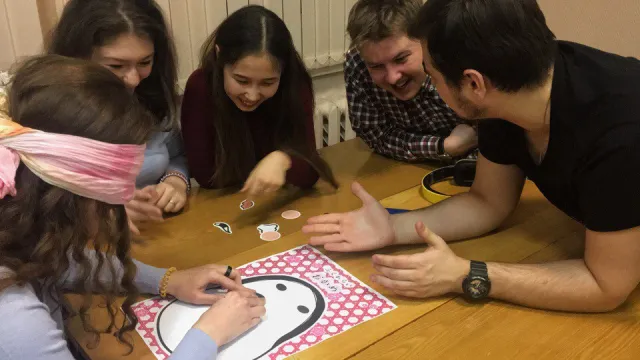
The main activity was to make a group mask of demon oni. When all masks were completed, the demons were banished by throwing beans and shouting「鬼は外! 福は内!」 (“Demons out! Luck in!”)
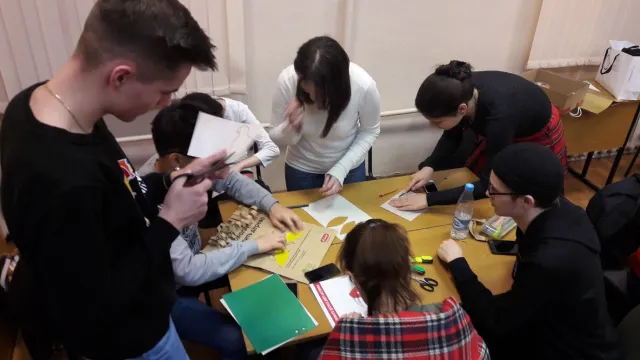
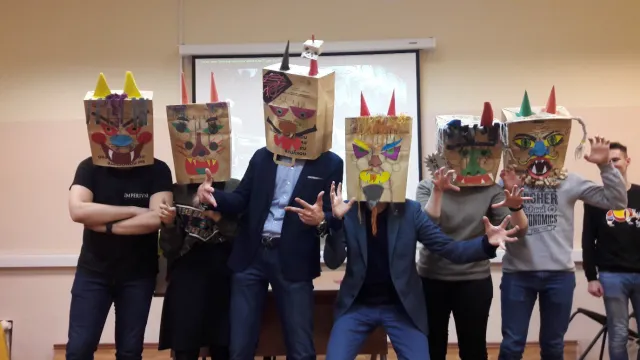
February was also the month to present to the HSE students two summer programs that Tokyo University of Foreign Studies offered for the academic year 2018-2019. TUFS Short Stay Summer Program 2018 for individual regisration and TUFS Business Summer School as a part of the special TUFS project “Inter-University Exchange Project (Russia) 2017”. The project aims to strengthen and maintain ties between TUFS and six Russian universities, one of which is HSE (Moscow). TUFS is going to welcome five HSE students at the summer school 2018. Professor Fesyun, Professor Strizhak and other teaching members of SAS have already made primary selection of the participants based on academic grade and social activities of applicants and have notified HSE’s coordinators, Alexei Kotlov and Ekaterina Bolshova, who are in charge of international affairs and students’ support. The process of screening has almost completed.
We believe this summer programs, and especially TUFS Business Summer School as a part of important exchange project, to be the next step for cooperation between our universities.
November Activity Report
3 December 2017
Global Japan Office Coordinator
Sofiia Pasivkina
On November 22, 2017 TUFS has established the 15th Global Japan Office and the first office in Moscow, Russia at the National Research University ‘Higher School of Economics’ (HSE). The opening ceremony was attended by TUFS Vice President Kayoko HAYASI, Professor Kyoko NUMANO, Professor Yoshikazu SUZUKI, Professor Shigeru ARAI, administrative staff Mai NAKAGAWA, and Russia’s branch coordinator Keiko KOBAYASHI. From the side of HSE there were Ms. Marina BATALINA, Head, Office for International Cooperation, Mr. Andrey FESYUN, Associate Professor, Faculty of World Economy and International Affairs, Ms. Uliana STRIZHAK, Associate Professor, Faculty of World Economy and International Affairs, Ms. Sofiia PASIVKINA, Coordinator, Global Japan Office Higher School of Economics, and Ms. Maria PONOMARYOVA, undergraduate student, Japan Studies at Faculty of World Economy and International Affairs. During the ceremony both parties exchanged warm greetings and strong willingness to collaborate cross-cultural education and research through student exchange and activities introducing Japanese culture in Russia. The main goal of the newly opened HSE Global Japan Office is to provide students with information and support to conduct research on Japan studies.
2017年11月22日、世界で15箇所目、ロシアで1箇所目のグローバル・ジャパン・オフィスがロシア国立研究大学「高等経済学院」(HSE)で開設されました。開所式には、東京外国語大学(TUFS)からは林佳世子理事・副学長、沼野恭子教授、鈴木義一教授、新井滋特任教授、中川麻衣専門職員、小林圭子在ロシアコーディネーターが参加し、高等経済学院からはマリーナ・バタリナ国際協力局長、東洋学科教務主任のアンドレイ・フェシユン准教授、日本研究室主任のウリアナ・ストリジャク准教授、ソフィア・パシフキナ在ロシアコーディネーターやポノマリョーワ・マリア学生代表者が参加しました。開所式では、双方があたたかい挨拶を交換し、ロシアにおける日本文化を紹介するイベントや学生交流を通して、異文化教育・研究で協同しようという強い意欲を示しました。新しく開設されたHSEグローバル・ジャパン・オフィスの主な目的の一つは、学生たちに情報やサポートを提供することです。
